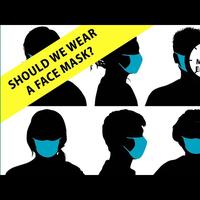Should we wear a face mask? 6 Minute English - YouTube
Hello. This is 6 Minute English from BBC
Learning English. I'm Rob.
And I'm Sam.
With the outbreak of the coronavirus epidemic,
people in many countries around the world
have started wearing face masks to protect
both themselves and others they come into
contact with. In this programme we'll
be asking whether wearing masks in public
can help prevent the spread of coronavirus
in the community?
Face masks have long been popular in some
Asian countries but with the spread of
Covid-19, they're increasingly being seen in other
parts of the world too.
Wearing a protective mask or face covering
is nothing new. Medical masks have a long
history from the plagues of medieval Europe
to nineteenth century outbreaks of cholera
in the United States, but when did they start
to be commonly used? That's my quiz question
for today: when and where were face masks
first widely used? Was it:
a) 1855 in Vienna, b) 1905 in Chicago, or
c) 1955 in London.
Well, you mentioned cholera outbreaks in the
US, so I'll say b) 1905 in Chicago.
Right Sam, we'll find out later if you were
right. Now, face masks may inspire confidence
but what is the evidence that they actually
protect the wearer from contracting the virus
or prevent infected people from spreading
the virus to others?
Professor Robert West has conducted a review
of over twenty studies looking into the evidence.
Here he is speaking to the BBC World Service
programme Health Check…
The evidence is equivocal on it. It doesn't
tell you anything yet - hopefully that will
change. So we're thrown back on first principles
and this is why, as in so many areas of public
health, you get such a heated debate because
people are really relying on their opinion
on things and you will have one group who
say, 'Well, it stands to reason',
the good old
‘stands to reason' argument – which
is: obviously, if you've got a covering
in front of your face, and you're speaking
or coughing into that covering, it's going
to trap quite a lot of the virus on the droplets
you'll be emitting.
So far the evidence over whether face masks
are helpful or harmful is equivocal – difficult
to interpret because it seems to have two
opposite or contradictory meanings.
Based on current evidence, Professor West
feels we cannot say whether mask-wearing
is beneficial.
Some evidence suggests that wearing masks
can prevent the disease spreading and some
suggests the opposite.
There may be reasons why wearing
masks could actually increase the spread
of coronavirus.
However for some people, it stands to reason
that masks are beneficial– meaning it is
obviously true from the facts.
Actually, the evidence is far from obvious.
But everyone has an opinion on the issue and
after weeks of stressful lockdown, this can
lead to heated debate – discussion or argument
in which people become angry and excited.
Up until recently, the World Health Organisation
said there were two groups who definitely
should wear masks: people showing symptoms
of the virus and their carers.
But that left the problem of people who have
the virus without knowing it and maybe
unintentionally emitting it – sending
something out into
the air, for example a noise or smell, or
in this case, coronavirus. In June the WHO
advice changed – now they say masks should
be worn in public where social distancing
measures are not possible.
But the advantages of wearing masks might
be outweighed by other considerations, as
Professor West explains…
It could also have unfortunate negative
consequences in terms of mask shaming
– that people feel
compelled to wear masks in situations where
it's actually not helpful and may be harmful
because it's expected of them and they feel
that they would be judged if they didn't.
But I think in addition to that, one of the
problems we have is that masks can potentially
create a false sense of security.
One negative effect is the practice of mask
shaming – criticising or humiliating someone
for not wearing a face covering.
Another problem is that wearing masks might
create a false sense of security – a feeling
of being safer than you really are. Is that
what happened in 1905 Rob?
Ah yes, today's quiz question. I asked you
when face masks were first widely used?
And I said, b) 1905 in Chicago.
Well done Sam, you were absolutely right!
It was 1905 in Chicago when Dr Alice Hamilton
first noticed that carers wearing masks to
treat scarlet fever patients,
did not get sick.
Interesting. Today we we've been discussing
whether wearing masks helps prevent infected
people emitting – or sending out, coronavirus.
So far the evidence is equivocal – unclear
because it seems contradictory. In other words,
we can't say either way for certain.
But for some, it stands to reason - meaning
it's obviously true - that mask-wearing
is a good idea.
This disagreement over wearing face coverings
has started heated debate – that's discussion
which becomes angry or excited.
And this in turn has led to incidents of mask
shaming – criticising or mocking people
for not wearing a face mask.
A final drawback is that masks might give
the wearer a false sense of security – that's
belief that they are safe when they are not.
That's all we've got time for today.
Bye for now!
Bye!

